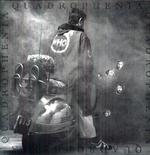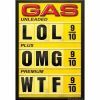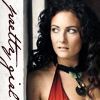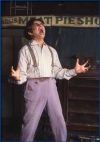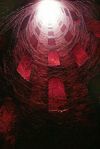Your favorite anti-hero characters from musicals
#25re: Your favorite anti-hero characters from musicals
Posted: 10/13/05 at 8:41pmAll of the "Vulgaria" characters in Chitty.
#26re: Your favorite anti-hero characters from musicals
Posted: 10/13/05 at 9:32pm
The concept goes all the way back to ancient Greece, when theatrical structure was more clearly defined. The hero or anti-hero is usually the protagonist (aka, main character).
But I don't believe there has to be a hero in a given story. Certainly not in our modern musical theatre. There doesn't necessarily have to be a single protagonist either (if it has a balanced "ensemble piece" storyline).
The musical "Sweeney Todd" has no heroes, unless you count the peripheral characters of Anthony and Johanna. And they are faintly heroic at best. Sweeney himself is the anti-hero as well as the protagonist of the story, but he's not the villain by any means. Look to Judge Turpin and the Beadle for that.
And, yes, anti-heroes can just as easily be female. How about Roxie Hart?
blocked: logan2, Diamonds3, Hamilton22
#27re: Your favorite anti-hero characters from musicals
Posted: 10/13/05 at 9:34pmFinch, Childcatcher, Sweeney Todd, Billy Flynn, Captain Hook
#28re: Your favorite anti-hero characters from musicals
Posted: 10/13/05 at 9:38pm
See, for me, Sally, there's a difference here...
Finch, Sweeney & Billy Flynn are principle characters who are not heroic in nature. I would call them anti-heroes for sure.
But the Childcatcher and Captain Hook are actually villains. Not the main character or focal point of their stories, and they serve as enemies of the "hero."
blocked: logan2, Diamonds3, Hamilton22
DramaDork925
Broadway Legend Joined: 9/4/05
#29re: Your favorite anti-hero characters from musicals
Posted: 10/13/05 at 9:41pm
The Witch ITW
Velma Von Tussle Hairspray
Billy Flynn Chicago
Frank N Furter Rocky Horror
#30re: Your favorite anti-hero characters from musicals
Posted: 10/13/05 at 9:57pm
Sweeney, definitely.
Okay, the dictionary definition of an antihero characterized by a lack of traditional heroic qualities, such as idealism or courage."
An antihero is NOT the villain of a piece. Basically, they're a main character that acts in a manner not befitting a hero but whose side the audience is on anyway. There doesn't need to be a hero to foil an antihero, because they're often the protagonist. I would argue that Javert isn't an antihero and is instead simply a very layered, complex antagonist. Despite the fact that he is a very well-drawn character that is designed for the audience to pity, the audience is not on his side--they're on Valjean's. There's a difference between villains and antiheros, even though it can be blurry.
#31re: Your favorite anti-hero characters from musicals
Posted: 10/14/05 at 4:30amHow about the Phantom?
#32re: Your favorite anti-hero characters from musicals
Posted: 10/14/05 at 5:00amThe "Emcee" in "Cabaret" - Forever!
#33re: Your favorite anti-hero characters from musicals
Posted: 10/14/05 at 7:55amFreddie in Chess.
#34re: Your favorite anti-hero characters from musicals
Posted: 10/14/05 at 9:28am
"I would argue that Javert isn't an antihero and is instead simply a very layered, complex antagonist. Despite the fact that he is a very well-drawn character that is designed for the audience to pity, the audience is not on his side--they're on Valjean's. There's a difference between villains and antiheros, even though it can be blurry."
But as a sympathetic antagonist, doesn't that make Javert an anti-hero in the same way an unsympathetic progtagonist is an anti-hero?
peach
Broadway Legend Joined: 3/29/05
#35re: Your favorite anti-hero characters from musicals
Posted: 10/14/05 at 9:52am
I'm including villains too, but here are my favorite "bad guys"
The Leading Player - Pippin
Judas - Jesus Christ Superstar
Applegate AND Lola - Damn Yankees
Sant
Broadway Legend Joined: 9/12/04
#36re: Your favorite anti-hero characters from musicals
Posted: 10/14/05 at 10:33am
Billy Flynn - CHICAGO
And a couple of not-so-obviously-anti-heros:
Phantom - THE PHANTOM OF THE OPERA
Norma Desmond - SUNSET BOULEVARD
#37re: Your favorite anti-hero characters from musicals
Posted: 10/14/05 at 10:54am
"But as a sympathetic antagonist, doesn't that make Javert an anti-hero in the same way an unsympathetic progtagonist is an anti-hero?"
No, I'm not buying that every antagonist we feel sorry for is an antihero. Would you say that a character like Sweeney is unsympathetic? The whole point is that the audience knows the character is acting in a manner not befitting a hero, but still feels for them and is on their side anyway.
The whole idea of an antihero is that they take up the space in a show or literary work that is usually occupied by the hero. Villains are villains. A sympathetic antagonist is a good character, not an antihero just because he's sympathetic. I think the term "antihero" is a bit more discerning than that.
#38re: Your favorite anti-hero characters from musicals
Posted: 10/14/05 at 11:59amKate from Lippa's 'Wild Party'.
#39re: Your favorite anti-hero characters from musicals
Posted: 10/14/05 at 12:08pmHere's another vote for John Wilkes Booth in ASSASSINS. "The Ballad of Booth" is one of Sondheim's best songs, I think.
SorryGrateful
Broadway Legend Joined: 5/10/05
#40re: Your favorite anti-hero characters from musicals
Posted: 10/14/05 at 12:12pmDoes Cinderella's Prince count? Either way, Sweeney is the ultimate musical anti-hero.
#41re: Your favorite anti-hero characters from musicals
Posted: 10/14/05 at 7:01pm
Best12...ahh yes I can see what you mean. I always thought of Captain Hook though as anti-hero but not villianous..I'm not sure why. I mean, true he kidnaps children and tries to kill Tinkerbell and Peter Pan...and Wendy..and Michael..and John....
Wooo nevermind.
How about the Artful Dodger?
#42re: Your favorite anti-hero characters from musicals
Posted: 10/14/05 at 7:04pm
I'll list mine, including some villians.
Miss Andrew- Mary Poppins
Count Fosco- The Woman in White
Javert- Les Miserables
George- Sunday in the Park with George
Blanche Ingram- Jane Eyre (No, haven't seen the show, just have the CD.)
Franca- Light in the Piazza (Well, remember "The Joy you Feel" and what she did with Fabrizio?)
That's all I can think of.
----------------------------------------------------------------
Family. It's all you really have.
-Sunday in the Park with George
"I'm not in Bambi and I'm not blonde!" - Idina Menzel
#43re: Your favorite anti-hero characters from musicals
Posted: 10/14/05 at 7:07pm
Good point, Taryn. I still wouldn't classify Javert as a villian. Villians are completely unsympathetic. I certainly believe him to be the antagonist, therefore, him being anti-hero really doesn't make sense. An anti-villian perhaps? Seeing that the audience knows he's not acting in a mannar befitting villians, but roots against him anyway.
Or something.
You know, I have no idea what I'm talking about, so I'm just gonna shut up. LOL
#44re: Your favorite anti-hero characters from musicals
Posted: 10/14/05 at 7:07pmThenardier. Now there's a villianous couple for you.
Chrysanthemum62001
Broadway Legend Joined: 2/14/04
#45re: Your favorite anti-hero characters from musicals
Posted: 10/14/05 at 7:10pm
Sweeney
John Wilkes Booth
Officer Lockstock
Gaston
#46re: Your favorite anti-hero characters from musicals
Posted: 10/14/05 at 7:13pmI really love most that are listed before, but i have to add specifically the Baroness in Chitty... it may just be because Jan Maxwell is amazing but I simply love this character!
#47re: Your favorite anti-hero characters from musicals
Posted: 10/14/05 at 7:28pm
J.
Pierrepont.
Finch.
My dream role.
wickedwitchofthechest
Leading Actor Joined: 8/13/04
#48re: Your favorite anti-hero characters from musicals
Posted: 10/14/05 at 8:27pmNot my favorites, but out of curiosity, would Jekyll/Hyde be considered as one entity as the anti-hero or as two entities and therefore the hero and villain?
#49re: Your favorite anti-hero characters from musicals
Posted: 10/14/05 at 8:50pmI've never seen Jekyl & Hyde, but, based on the book, I would consider them one person and call him a tragic hero, not an anti-hero. He was fighting against himself and lost . . . I mean Dr. Jekyl lost . . . right? . . . oh boy, time to read the book again, lol).
Videos





